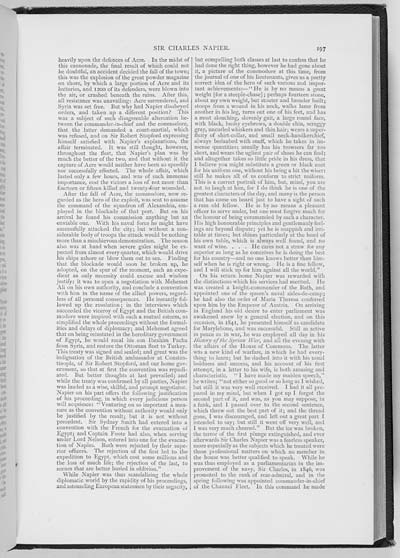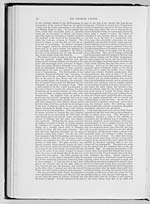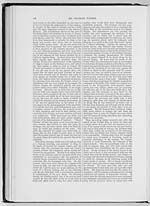197
heavily upon the defences of Acre. In the midst of
this cannonade, the final result of which could not
be doubtful, an accident decided the fall of the town;
this was the explosion of the great powder magazine
on shore, by which a large portion of Acre and its
batteries, and 1200 of its defenders, were blown into
the air, or crushed beneath the ruins. After this,
all resistance was unavailing: Acre surrendered, and
Syria was set free. But why had Napier disobeyed
orders, and taken up a different position? This
was a subject of such disagreeable altercation be-
tween the commander-in-chief and the commodore,
that the latter demanded a court-martial, which
was refused, and on Sir Robert Stopford expressing
himself satisfied with Napier's explanations, the
affair terminated. It was still thought, however,
throughout the fleet, that Napier's plan was by
much the better of the two, and that without it the
capture of Acre would neither have been so speedily
nor successfully effected. The whole affair, which
lasted only a few hours, and was of such immense
importance, cost the victors a loss of not more than
fourteen or fifteen killed and twenty four wounded.
After the fall of Acre, the commodore, now re-
garded as the hero of the exploit, was sent to assume
the command of the squadron off Alexandria, em-
ployed in the blockade of that port. But on his
arrival he found his commission anything but an
enviable one. With his naval force he might have
successfully attacked the city; but without a con-
siderable body of troops the attack would be nothing
more than a mischievous demonstration. The season
also was at hand when severe gales might be ex-
pected from almost every quarter, which would drive
his ships ashore or blow them out to sea. Finding
that the blockade would soon be broken up, he
adopted, on the spur of the moment, such an expe-
dient as only necessity could excuse and wisdom
justify: it was to open a negotiation with Mehemet
Ali on his own authority, and conclude a convention
with him in the name of the allied powers, regard-
less of all personal consequences. He instantly fol-
lowed up the resolution; in the interviews which
succeeded the viceroy of Egypt and the British com-
modore were inspired with such a mutual esteem, as
simplified the whole proceedings without the formal-
ities and delays of diplomacy; and Mehemet agreed
that on being reinstated in the hereditary government
of Egypt, he would recal his son Ibrahim Pacha
from Syria, and restore the Ottoman fleet to Turkey.
This treaty was signed and sealed; and great was the
indignation of the British ambassador at Constan-
tinople, of Sir Robert Stopford, and our home gov-
ernment, so that at first the convention was repudi-
ated. But better thoughts at last prevailed; and
while the treaty was confirmed by all parties, Napier
was lauded as a wise, skilful, and prompt negotiator.
Napier on his part offers the following justification
of his proceeding, in which every judicious person
ivill acquiesce: "Venturing on so important a mea-
sure as the convention without authority would only
be justified by the result; but it is not without
precedent. Sir Sydney Smith had entered into a
convention with the French for the evacuation of
Egypt; and Captain Foote had also, when serving
under Lord Nelson, entered into one for the evacua-
tion of Naples. Both were rejected by their supe-
rior officers. The rejection of the first led to the
expedition to Egypt, which cost some millions and
the loss of much life; the rejection of the last, to
scenes that are better buried in oblivion."
While Napier was thus scandalizing the whole
diplomatic world by the rapidity of his proceedings,
and astounding European statesmen by their sagacity,
but compelling both classes at last to confess that he
had done the right thing, however he had gone about
it, a picture of the commodore at this time, from
the journal of one of his lieutenants, gives us a pretty
correct idea of the hero of such various and impor-
tant achievements:�"He is by no means a great
weight [for a steeple-chase]; perhaps fourteen stone,
about my own weight, but stouter and broader built;
stoops from a wound in his neck, walks lame from
another in his leg, turns out one of his feet, and has
a most slouching, slovenly gait, a large round face,
with black, bushy eyebrows, a double chin, scraggy
gray, uncurled whiskers and thin hair; wears a super-
fluity of shirt-collar, and small neck-handkerchief,
always bedaubed with snuff, which he takes in im-
mense quantities; usually has his trowsers far too
short, and wears the ugliest pair of shoes he can find;
and altogether takes so little pride in his dress, that
I believe you might substitute a green or black coat
for his uniform one, without his being a bit the wiser:
still he makes all of us conform to strict uniform.
This is a correct portrait of him, but, mind, you are
not to laugh at him, for I do think he is one of the
greatest characters of the day, and many is the person
that has come on board just to have a sight of such
a rum old fellow. He is by no means a pleasant
officer to serve under, but one must forgive much for
the honour of being commanded by such a character.
His high honourable principles and gentlemanly feel-
ings are beyond dispute; yet he is snappish and irri-
table at times; but shines particularly at the head of
his own table, which is always well found, and no
want of wine. . . . He cares not a straw for any
superior as long as he conceives he is doing the best
for his country�and no one knows better than him-
self when he is right or wrong. He is a fine fellow,
and I will stick up for him against all the world."
On his return home Napier was rewarded with
the distinctions which his services had merited. He
was created a knight-commander of the Bath, and
appointed one of the queen's naval aides-de-camp;
he had also the order of Maria Theresa conferred
upon him by the Emperor of Austria. On arriving
in England his old desire to enter parliament was
awakened anew by a general election, and on this
occasion, in 1841, he presented himself as candidate
for Marylebone, and was successful. Still as active
in peace as in war, he was employed all day in his
History of the Syrian War, and all the evening with
the affairs of the House of Commons. The latter
was a new kind of warfare, in which he had every-
thing to learn; but he dashed into it with his usual
boldness and success, and his account of his first
attempt, in a letter to his wife, is both amusing and
characteristic. "I have made my maiden speech,"
he writes; "not either so good or so long as I wished,
but still it was very well received. I had it all pre-
pared in my mind, but when I got up I forgot the
second part of it, and was, as you may suppose, in
a funk, and I passed over to the second sentence,
which threw out the best part of it; and the thread
gone, I was discouraged, and left out a great part I
intended to say; but still it went off very well, and
I was very much cheered." But the ice was broken,
the terror of the first plunge extinguished, and ever
afterwards Sir Charles Napier was a fearless speaker,
more especially as the subjects which he treated were
those professional matters on which no member in
the house was better qualified to speak. While he
was thus employed as a parliamentarian in the im-
provement of the navy, Sir Charles, in 1846, was
promoted to the rank of rear-admiral, and in the
spring following was appointed commander-in-chief
of the Channel Fleet. In this command he made

![]() Universal Viewer |
Universal Viewer | ![]() Mirador |
Large image | Transcription
Mirador |
Large image | Transcription
![]()

